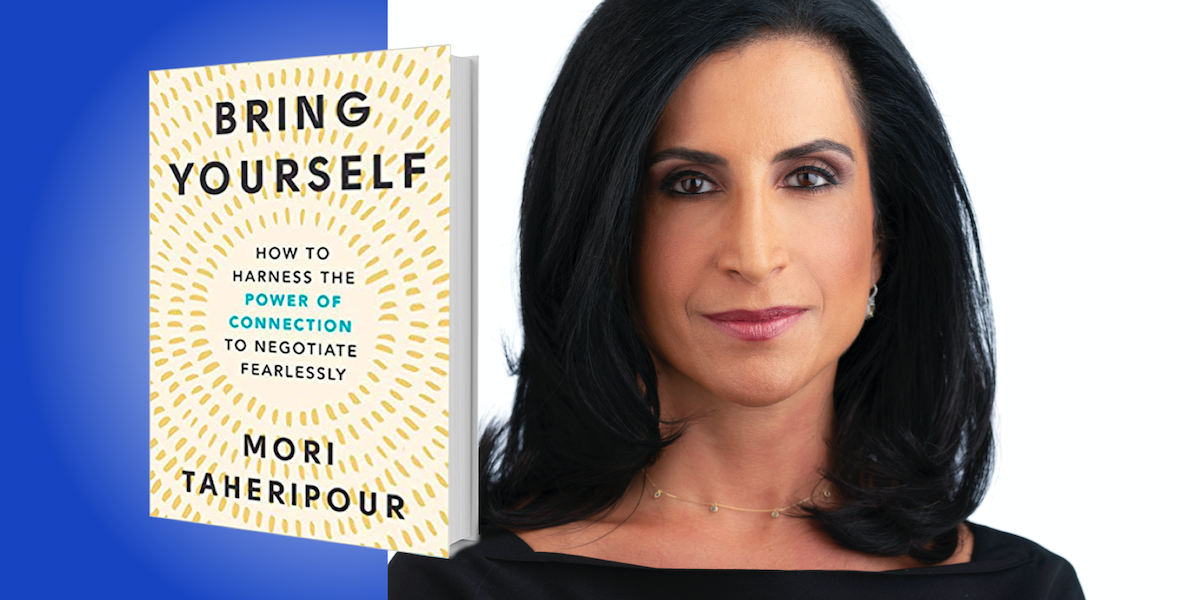Mori Taheripour is an award-winning Negotiation faculty member at the Wharton School. She is also a globally-recognized cross-sector consultant for a broad spectrum of stakeholders that include major sports organizations, high-profile athletes, Fortune 100 companies, government agencies, and NGOs.
Below, Mori shares 5 key insights from her new book, Bring Yourself: How to Harness the Power of Connection to Negotiate Fearlessly. Download the Next Big Idea App to enjoy more audio “Book Bites,” plus Ideas of the Day, ad-free podcast episodes, and more.
1. Negotiation is something we do all the time.
Negotiating is something we have done almost every day of our lives. When we were toddlers, we threw a tantrum to get our way. When you make a pros and cons list about taking a new job, that’s a negotiation with yourself. And when you have to get your playful dog to go back inside the house, that’s a negotiation too. You’re constantly negotiating whether you realize it or not, and because you have so much practice, you’re probably better at it than you think you are.
2. Anyone can be a great negotiator.
There’s a stereotype that skilled negotiators are aggressive and unemotional, but people who are deeply empathetic can be great negotiators as well. Great negotiators don’t pretend to be someone they’re not; instead, they have the courage to communicate exactly who they are, what they want, and what they bring to the table. So how do we do this? The key is in understanding yourself first—knowing who you are, embracing your personal values, establishing your boundaries, and being clear about where you can and cannot compromise.
“You’re constantly negotiating whether you realize it or not, and because you have so much practice, you’re probably better at it than you think you are.”
3. Negotiation is about human connections.
The most important part of a negotiation is not the transaction, but the conversation and connection developed upon first meeting your counterpart. Take the time to get to know each other, ask questions, show authentic interest, and lead with empathy. By staying in fact-finding mode instead of sticking to a script, you elevate curiosity above certainty. You’re not committed to only one route and one outcome—you’re open and engaged enough to find the best path to agreement.
4. Our stories often sell us short.
We can be our own worst enemy in negotiation because of the stories we tell ourselves: I lack relevant experience. I am young and probably naive. If self-doubt drives our negotiations, we start determining the outcomes before we even begin. But the more confident you are about your story, the less vulnerable you are to those who would question it. Indeed, research from positive psychology tells us that the more positive our narrative, the better our results. Simply said, if you expect more, you will get more.
5. Wherever you are, be there fully.
Cultivating presence is one of the most important things we can do to find satisfaction in our day-to-day lives, our relationships, and our negotiations. When we’re distracted, we get our information not in totality, but through a filter. Without being present, you’re unable to tap into your emotional intelligence, and truly understand the state of mind of your counterpart. Emotional intelligence is, after all, your super power in negotiation, and distraction is like kryptonite. But there are many ways to practice presence, from daily meditation to simply turning your phone off at dinner.
For more Book Bites, download the Next Big Idea App today:

































